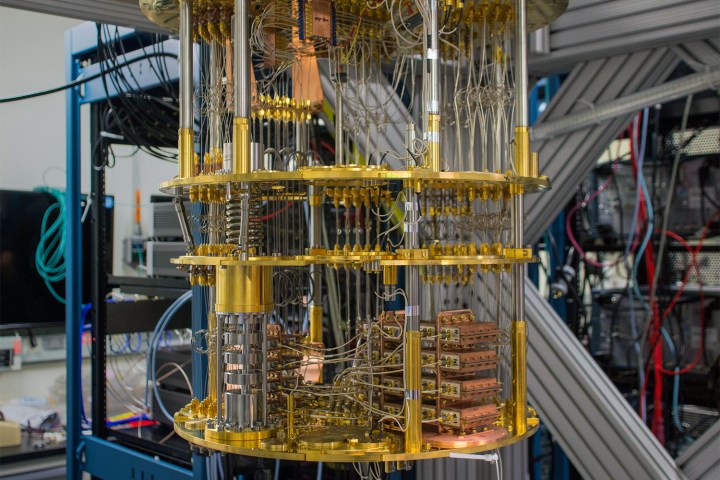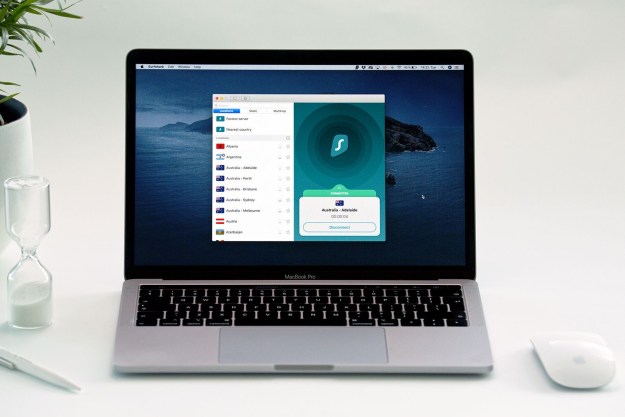When you first stumble across the term “quantum computer,” you might pass it off as some far-flung science fiction concept rather than a serious current news item.
But with the phrase being thrown around with increasing frequency, it’s understandable to wonder exactly what quantum computers are, and just as understandable to be at a loss as to where to dive in. Here’s the rundown on what quantum computers are, why there’s so much buzz around them, and what they might mean for you.
What is quantum computing, and how does it work?
All computing relies on bits, the smallest unit of information that is encoded as an “on” state or an “off” state, more commonly referred to as a 1 or a 0, in some physical medium or another.
Most of the time, a bit takes the physical form of an electrical signal traveling over the circuits in the computer’s motherboard. By stringing multiple bits together, we can represent more complex and useful things like text, music, and more.

The two key differences between quantum bits and “classical” bits (from the computers we use today) are the physical form the bits take and, correspondingly, the nature of data encoded in them. The electrical bits of a classical computer can only exist in one state at a time, either 1 or 0.
Quantum bits (or “qubits”) are made of subatomic particles, namely individual photons or electrons. Because these subatomic particles conform more to the rules of quantum mechanics than classical mechanics, they exhibit the bizarre properties of quantum particles. The most salient of these properties for computer scientists is superposition. This is the idea that a particle can exist in multiple states simultaneously, at least until that state is measured and collapses into a single state. By harnessing this superposition property, computer scientists can make qubits encode a 1 and a 0 at the same time.
The other quantum mechanical quirk that makes quantum computers tick is entanglement, a linking of two quantum particles or, in this case, two qubits. When the two particles are entangled, the change in state of one particle will alter the state of its partner in a predictable way, which comes in handy when it comes time to get a quantum computer to calculate the answer to the problem you feed it.
A quantum computer’s qubits start in their 1-and-0 hybrid state as the computer initially starts crunching through a problem. When the solution is found, the qubits in superposition collapse to the correct orientation of stable 1s and 0s for returning the solution.
What is the benefit of quantum computing?
Aside from the fact that they are far beyond the reach of all but the most elite research teams (and will likely stay that way for a while), most of us don’t have much use for quantum computers. They don’t offer any real advantage over classical computers for the kinds of tasks we do most of the time.
However, even the most formidable classical supercomputers have a hard time cracking certain problems due to their inherent computational complexity. This is because some calculations can only be achieved by brute force, guessing until the answer is found. They end up with so many possible solutions that it would take thousands of years for all the world’s supercomputers combined to find the correct one.

The superposition property exhibited by qubits can allow supercomputers to cut this guessing time down precipitously. Classical computing’s laborious trial-and-error computations can only ever make one guess at a time, while the dual 1-and-0 state of a quantum computer’s qubits lets it make multiple guesses at the same time.
So, what kind of problems require all this time-consuming guesswork calculation? One example is simulating atomic structures, especially when they interact chemically with those of other atoms. With a quantum computer powering the atomic modeling, researchers in material science could create new compounds for use in engineering and manufacturing. Quantum computers are well suited to simulating similarly intricate systems like economic market forces, astrophysical dynamics, or genetic mutation patterns in organisms, to name only a few.
Amidst all these generally inoffensive applications of this emerging technology, though, there are also some uses of quantum computers that raise serious concerns. By far the most frequently cited harm is the potential for quantum computers to break some of the strongest encryption algorithms currently in use.
In the hands of an aggressive foreign government adversary, quantum computers could compromise a broad swath of otherwise secure internet traffic, leaving sensitive communications susceptible to widespread surveillance. Work is currently being undertaken to mature encryption ciphers based on calculations that are still hard for even quantum computers to do, but they are not all ready for prime-time, or widely adopted at present.
Is quantum computing even possible?
A little over a decade ago, actual fabrication of quantum computers was barely in its incipient stages. Starting in the 2010s, though, development of functioning prototype quantum computers took off. A number of companies have assembled working quantum computers as of a few years ago, with IBM going so far as to allow researchers and hobbyists to run their own programs on it via the cloud.

Despite the strides that companies like IBM have undoubtedly made to build functioning prototypes, quantum computers are still in their infancy. Currently, the quantum computers that research teams have constructed so far require a lot of overhead for executing error correction. For every qubit that actually performs a calculation, there are several dozen whose job it is to compensate for the one’s mistake. The aggregate of all these qubits make what is called a “logical qubit.”
Long story short, industry and academic titans have gotten quantum computers to work, but they do so very inefficiently.
Who has a quantum computer?
Fierce competition between quantum computer researchers is still raging, between big and small players alike. Among those who have working quantum computers are the traditionally dominant tech companies one would expect: IBM, Intel, Microsoft, and Google.
As exacting and costly of a venture as creating a quantum computer is, there are a surprising number of smaller companies and even startups that are rising to the challenge.
The comparatively lean D-Wave Systems has spurred many advances in the field and proved it was not out of contention by answering Google’s momentous announcement with news of a huge deal with Los Alamos National Labs. Still, smaller competitors like Rigetti Computing are also in the running for establishing themselves as quantum computing innovators.

Depending on who you ask, you’ll get a different frontrunner for the “most powerful” quantum computer. Google certainly made its case recently with its achievement of quantum supremacy, a metric that itself Google more or less devised. Quantum supremacy is the point at which a quantum computer is first able to outperform a classical computer at some computation. Google’s Sycamore prototype equipped with 54 qubits was able to break that barrier by zipping through a problem in just under three-and-a-half minutes that would take the mightiest classical supercomputer 10,000 years to churn through.
Not to be outdone, D-Wave boasts that the devices it will soon be supplying to Los Alamos weigh in at 5000 qubits apiece, although it should be noted that the quality of D-Wave’s qubits has been called into question before. IBM hasn’t made the same kind of splash as Google and D-Wave in the last couple of years, but they shouldn’t be counted out yet, either, especially considering their track record of slow and steady accomplishments.
Put simply, the race for the world’s most powerful quantum computer is as wide open as it ever was.
Will quantum computing replace traditional computing?
The short answer to this is “not really,” at least for the near-term future. Quantum computers require an immense volume of equipment, and finely tuned environments to operate. The leading architecture requires cooling to mere degrees above absolute zero, meaning they are nowhere near practical for ordinary consumers to ever own.

But as the explosion of cloud computing has proven, you don’t need to own a specialized computer to harness its capabilities. As mentioned above, IBM is already offering daring technophiles the chance to run programs on a small subset of its Q System One’s qubits. In time, IBM and its competitors will likely sell compute time on more robust quantum computers for those interested in applying them to otherwise inscrutable problems.
But if you aren’t researching the kinds of exceptionally tricky problems that quantum computers aim to solve, you probably won’t interact with them much. In fact, quantum computers are in some cases worse at the sort of tasks we use computers for every day, purely because quantum computers are so hyper-specialized. Unless you are an academic running the kind of modeling where quantum computing thrives, you’ll likely never get your hands on one, and never need to.
Editors' Recommendations
- Best desktop computer deals: The cheapest PC deals today
- Wholesale laptop deals: How to buy cheap computers in bulk
- Meta Quest 4: Here’s what we want from the next big VR headset
- Intel’s next-gen GPU might be right around the corner
- Do you need a VPN at home? Potential benefits explained



